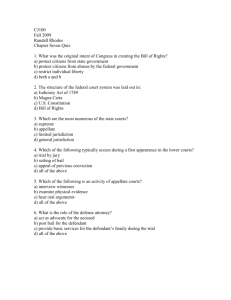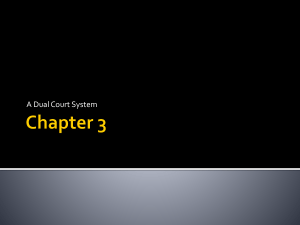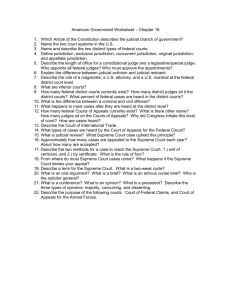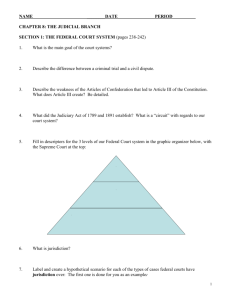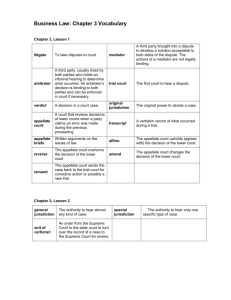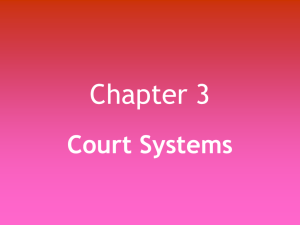The Courts - MathiasLink
advertisement
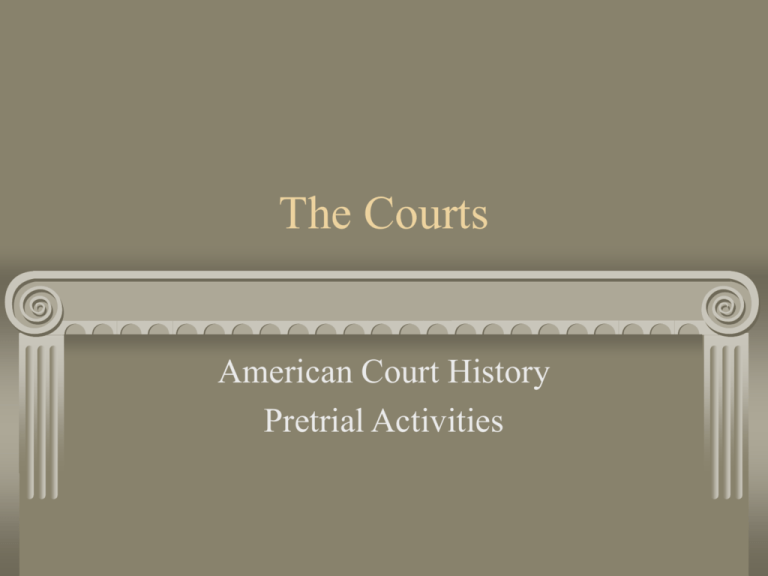
The Courts American Court History Pretrial Activities Significant Quotes There is no such thing as justice – in or out of court. Clarence Darrow (1857 – 1938) Significant Quotes No person shall be held to answer for a capital or otherwise infamous crime, unless on a presentment or indictment of a grand jury …nor shall any person be subject for the same offense to be twice put in jeopardy of life or limb; nor shall be compelled in any criminal case to be a witness against himself, nor deprived of life, liberty or property without due process of law. THE FIFTH AMENDMENT Significant Quotes After years of twisting the Constitution into a pretzel, handcuffing cops and drooling over the rights of killers and rapists, America’s judges have suddenly discovered violent crime, and they’re fretting that it might come to their neighborhood soon. Washington Times Editorial Key Concepts Federal court system Appellate jurisdiction Original jurisdiction Circuit courts Writ of Certiorari Bail bond Release on recognizance Key Concepts State court systems Judicial review Appeal Impeachment Trial court Plea Property bond Key Concepts Initial appearance Jurisdiction Trial de novo Nolo contendere Pretrial release Plea bargaining Key Cases US v. MontalvoMurillo Herrera v. Collins Minnick v. Mississippi County of Riverside (CA) v. McLaughlin Keeney v. TamayoReyes US v. AlvarezMachain. The Courts Between the police quest for suspects and potential prison time THE COURTS American Court History Two courts work and coexist State courts Federal courts American Court History Federal Court System: 3 – tiered structure of courts involving US District Court, US Courts of Appeal and US Supreme Court State Court Systems: States have three court levels, trial courts, appellate courts, and state supreme court. Colonial Courts 1629 Massachusetts Bay Colony created a “General Court.” Made laws, held trials, and sentenced. Colonial Court History Pennsylvania had the idea that every man could serve as his own lawyer. Peace Keepers listened to arguments and made binding decisions. Today the idea of Justices of the Peace in some states. Problems in Colonial Courts States lacked trained lawyers. Virginia prohibited practicing law for a fee. Barriers to becoming a lawyer. Govenor Cosby v. John Zenger in 1775. AFTER the Revolution States were hardly uniform in their laws. Often had no means for appeal from the ORIGINAL JURISDICTION to the APPELLATE JURISDICTION. VOCABULARY Jurisdiction: The territory, subject matter, or persons over which lawful authority may be exercised by a court or other justice agency as determined by statute or constitution. American Court History The Civil War (1861 – 1865) was somewhat fought to establish the right of the federal government to govern state courts. The Right of Federal Appeal Marbury v. Madison in 1804 The 14th Amendment – states can’t pass laws that abridge the US Constitution and the Bill of Rights. State Courts Today Reform efforts to have more consistency between states More appellate jurisdiction – lawful authority of a court to review a decision made by a lower court. State Courts Today Decisional Model – is informal, personal and decisive. Quick resolution of uncomplicated issues of law and fact. State Courts Today Courts of General jurisdiction – follow procedural model with prosecutors, defense attorneys, juries, etc. Trial de Novo – Cases that get retried on appeal vs. those simply reviewed by the record. Appeals Generally the request that a court with appellate jurisdiction review the judgment, decision or order of a lower court and set it aside or modify it. Trial de Novo – Cases that get retried on appeal vs. those simply reviewed by the record. SPECIAL NOTES Most convictions are affirmed upon review. You can appeal from the state to the federal courts ONLY if your rights guaranteed by the Constitution are violated. Court Cases About Appeals Keeney v. Tamayo – Reyes: If the state court screwed up because of actual prejudice, then the federal court can order fact-finding. Herrera v. Collins: New evidence of innocence is no reason for a federal court to order a new state trial IF Constitutional rights were NOT violated. Dispute Resolution Centers Informal hearing infrastructure designed to mediate without the need to go to criminal trial court. The Rise of Federal Courts Federal District Court: Judges appointed by the president, confirmed by Senate and serve for life. Trial courts for all cases of violations of federal laws. District Court Judges Chief Judge Richard G. Kopf (Lincoln) Judge Thomas M. Shanahan (Omaha) Judge Joseph F. Bataillon (Omaha) Senior Judge Warren K. Urbom (Lincoln) Senior Judge Lyle E. Strom (Omaha) Before you think it is a “cushy” job 650 District Court Judges in the US. 45,473 criminal cases and 236,391 civil cases filed last year in the country. US Court of Appeals Intermediate appellate courts in the federal system. Twelve of the courts have jurisdiction based on geographic area. Often called circuit courts. US Court of Appeals Has jurisdiction over US District Courts in their circuits. Judicial Review: The power of a court to review actions and decisions by other agencies of government. Types of Appeals in US Circuit Court Frivolous appeals. Ritualistic appeals – primarily brought because the litigants demanded it – chances of reversal virtually nil. Nonconsensual appeals – entail questions of law and policy. Professional disagreement. The Supreme Court of the United States Has judicial review of lower court decisions and state and federal statute. Make law comply to the Constitution or reinterpret the Constitution. The Supreme Court Does not conduct trials. ONLY when a lawyer is being disbarred by a state. Trials like impeachment, one serves as judge. The Supreme Court Today Rather, the Court reviews the decisions of lower courts and may accept cases from both the US courts of appeals and state supreme courts. Four judges have to agree to a hearing. The Supreme Court Today If they want to review a case the justices issue a writ of certiorari ordering it to send the record of the case for review. Justices can then revoke the decision of the lower courts. The Supreme Court Today In reviews the full court selects cases to “hear” where an attorney for each side speaks about the case and answer judges’ questions. Judges’ then write opinions and majority rules. Pretrial Activities First Appearance: An appearance before a magistrate which starts the trial process, where the defendant’s arrest is assessed, and he or she is informed of the charges, and bail set. Bail An agreement guaranteeing the required appearance of a defendant in court, which records a pledge of money or property to be paid to the court if he or she does not appear. Bail The Eighth Amendment to the US Constitution requires the opportunity for bail. “Excessive bail shall not be required …” Statistics of Bail 16% of defendants released before trial are rearrested. 30% were arrested more than once. 41% of those out on bail are out after doing serious crimes like rape and robbery. Bail 1990 US v. MontalvoMurillo – a defendant doesn’t have a “right” to freedom because of minor crimes. The Preliminary Hearing Kind of a shortened trial. Judge summarizes charges and reviews defendant’s rights. Prosecution offers witnesses and proof. The Preliminary Hearing Defendant has the opportunity to challenge his/her detention. Establishes for the judge if there is probable cause. The Grand Jury 25 states use as part of pre-trial process. A MUST in cases where judicial and prosecutor discretion might be questioned. Arraignment and Plea Charges are formally read to the defendant and they enter a plea. In criminal proceedings, the defendant’s formal answer in court to the charge contained in the indictment that he/she is guilty or not guilty. Third Option to Plead Nolo Contendere: plea of no contest. No contest does not admit guilt, however it cannot provide the basis for later civil suits. Plea Bargaining The negotiated agreement between defendant, prosecutor and the court as to what an appropriate plea and associated sentence should be. Circumvents the trial process and reduces time in court. After a plea has been entered, it can be withdrawn as long as the defendant proves to the judge he/she had been badly advised by their lawyer . Conditions for Plea Bargaining Judge of their rights they are surrendering by pleading guilty. Determine if the plea is voluntary. Publicly declare what the agreement was. Make some guarantees of punishment / safety of the community. Chemical castration case.
